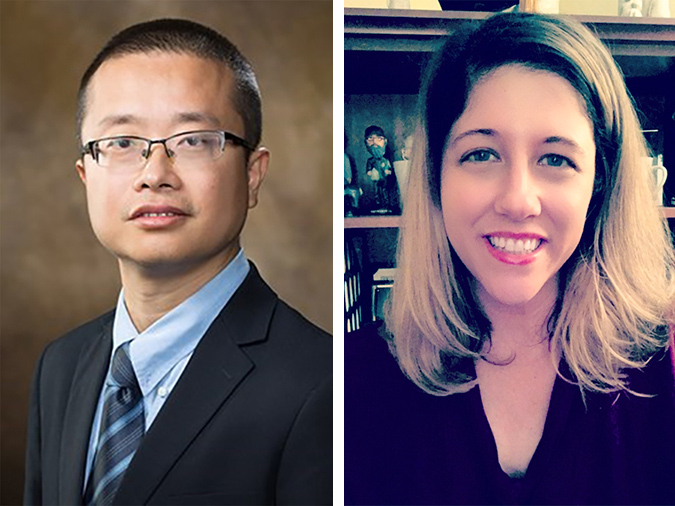
FAYETTEVILLE, Ark. – Weiyi Ma and Amanda Williams have joined the faculty in the U of A's School of Human Environmental Science's human development and family sciences program, both as assistant professors.
"I am pleased to announce the addition of Weiyi Ma and Amanda Williams to the HESC faculty," said Betsy Garrison, professor and director of the School of Human Environmental Sciences in the Dale Bumpers College of Agricultural, Food and Life Sciences. "With their experience and knowledge, I know the human development and family sciences program will benefit."
In addition to teaching, both will be conducting research. Ma will be leading research efforts at the Jean Tyson Child Development Study Center while Williams will focus research on adolescent and emerging adult health and development.
Ma's focus is to build a nationally and internationally recognized research program on child cognitive and language development at the Tyson Child Development Study Center, which is part of Bumpers College and the School of Human Environmental Sciences.
"I am honored to join the faculty at the U of A, Bumpers College and the School of Human Environmental Sciences," said Ma. "My research expertise strengthens and complements the existing and emerging research strength at the school. The School of Human Environmental Sciences has achieved an emerging prominent international reputation for its research excellence in human development. This makes the U of A an ideal platform for further research on children's language learning and its relation to cognitive development."
Research by Williams emphasizes youth and family embeddedness in physical, social and virtual contexts; cascading risks and life course resilience, particularly of vulnerable youth and families; social media technology and digital advocacy; and evaluation of community programs.
"I spent the last four years as an assistant professor at the University of Southern Mississippi, where I was primarily in teaching and advising roles," said Williams. "I am looking forward to this more research-intensive position with opportunities to collaborate within my program area as well as across campus."
In conducting his research, Ma hopes to incorporate eye-tracking methods for preverbal children with expressive difficulties to be used in testing language knowledge. He hopes to build the first eye-tracking testing station in Arkansas, which could be used in nurseries and homes, extending his research into translational science.
"My expertise in language development and cognitive neuroscience will complement the current research interests of the school by building collaborations with researchers who have expertise in other relevant disciplines (aging, school psychology, music perception, etc.)," said Ma. "My goal is to help the U of A maintain and improve its research excellence and international reputation."
He also hopes to partner with faculty members from multiple disciplines across campus and at other universities in forming a global research network and working with researchers in China, Australia and Singapore.
"We are very excited about the two members added to the HDFS faculty," said Tim Killian, associate professor and assistant director of HESC. "Both are conducting exciting and cutting edge research, and we are proud to count them as part of our faculty."
Williams was assistant professor, the Nina Bell Suggs Endowed Professor and director of the Child and Family Studies Master's Program in the College of Education and Psychology at the University of Southern Mississippi from 2013 to 2017.
She was named a Service-Learning Faculty Fellow at USM in 2015 and received her college's Outstanding Junior Faculty Award in 2013. She has received funding for several projects from the Oklahoma Agricultural Experiment Station, the Foundation for the Scientific Study of Sexuality and multiple University of Southern Mississippi research grants.
Williams earned her bachelor's degree in human development and family sciences in 2007, her master's degree in developmental and family science in 2009 and her doctorate in human environmental sciences in 2013, all from Oklahoma State University.
Ma was associate investigator of the Australian Research Council's Centre of Excellence in Cognition and its Disorders, and a member of the human science faculty at Macquarie University in Sydney, Australia, from 2014 to 2017. He has also served as assistant, associate and adjunct associate professor, and research fellow at the University of Electronic Science and Technology of China in Chengdu; and as a research assistant, laboratory coordinator and teaching assistant at the University of Delaware.
He earned his bachelor's degree in educational psychology from China West Normal University in Szechuan in 1999, and his master's degree in linguistics in 2004 and his doctorate in cognition, development and instruction (early childhood education) in 2009, both from the University of Delaware.
About the Dale Bumpers College of Agricultural, Food and Life Sciences: Bumpers College provides life-changing opportunities to position and prepare graduates who will be leaders in the businesses associated with foods, family, the environment, agriculture, sustainability and human quality of life; and who will be first-choice candidates of employers looking for leaders, innovators, policy makers and entrepreneurs. The college is named for Dale Bumpers, former Arkansas governor and longtime U.S. senator who made the state prominent in national and international agriculture.
About the University of Arkansas: The University of Arkansas provides an internationally competitive education for undergraduate and graduate students in more than 200 academic programs. The university contributes new knowledge, economic development, basic and applied research, and creative activity while also providing service to academic and professional disciplines. The Carnegie Foundation classifies the University of Arkansas among only 2 percent of universities in America that have the highest level of research activity. U.S. News & World Report ranks the University of Arkansas among its top American public research universities. Founded in 1871, the University of Arkansas comprises 10 colleges and schools and maintains a low student-to-faculty ratio that promotes personal attention and close mentoring.
Contacts
Robby Edwards, director of communications
Dale Bumpers College of Agricultural, Food and Life Sciences
479-575-4625,